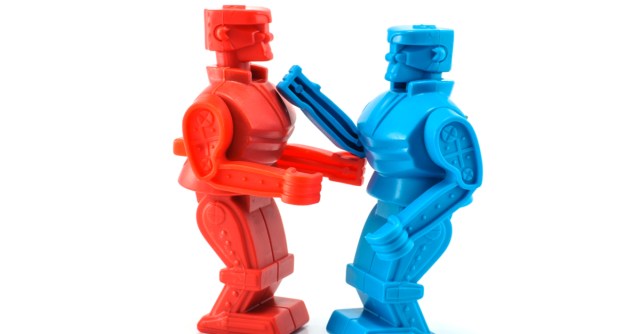The good news: Bots will probably have little to no real influence in the current battle over net neutrality. They are almost embarrassingly obvious – not ready for the front lines of this kind of conflict.
The less good news: Bots – or rather the people behind them – tried pretty hard, and blew a fair amount of smoke in the process.
But try as they might, bots have done little to change opinions on the matter – at least one poll says a large majority of Americans, of all political persuasions, support net neutrality.
Freedman Consulting reported in July that 73% of Republicans, 80% of Democrats and 76% of Independents want to keep the Federal Communications Commission’s (FCC) 2015 Open Internet Order, which forbids internet service providers (ISPs) from discriminating against rival services or charging consumers and businesses more to use an internet “fast lane.” The aim is to prevent airline-style first-class “seats” for the rich, while everybody else rides in steerage.
But, thanks to bots, “public opinion” is less clear when it comes to about 21.8 million comments submitted to the FCC since the current chairman, former Verizon lawyer Ajit Pai, proposed rolling back significant elements of that order’s provisions.
Which is pretty much the point of bots – to obscure the opinions of actual humans. As Motherboard reported this week, data analytics company Gravwell found that only about 18% (3,863,929) of the comments submitted to the FCC website and through its API were “unique.”
The rest were likely from “automated astroturfing bots,” and overwhelmingly favored doing away with net neutrality – the opposite of the Freedman poll’s findings. However, Gravwell did find a few that supported net neutrality.
According to Gravwell founder Corey Thuen, the bot-generated comments weren’t that difficult to spot. He said the comment below, which referenced the 2015 order to classify internet broadband as a “telecommunication service” under Title II, therefore establishing net neutrality, was sent 1.2 million times:
The unprecedented regulatory power the Obama Administration imposed on the internet is smothering innovation, damaging the American economy and obstructing job creation.
I urge the Federal Communications Commission to end the bureaucratic regulatory overreach of the internet known as Title II and restore the bipartisan light-touch regulatory consensus that enabled the internet to flourish for more than 20 years.\n\nThe plan currently under consideration at the FCC to repeal Obama’s Title II power grab is a positive step forward and will help to promote a truly free and open internet for everyone.
Another was sent nearly 1.1 million times in August alone.
The report’s findings are no surprise – complaints about phony comments have come from those on both sides of the debate since before the FCC comment window opened.
ZDNet reported in May 2017 that more than 128,000 identical comments had already been submitted, even though the official comment period didn’t open until 18 May 2017. Some of those whose names were on those comments told ZDNet they had not submitted them. One confessed to not even knowing what net neutrality was.
Joan Marsh, executive vice president of regulatory and state external affairs for telecom AT&T, complained in a blog post on 30 August 2017 that, of millions of “mass-produced comments,” most of them:
…appear to us to be fraudulent. Millions of comments were generated using phony email addresses. Millions of others were generated using duplicative email or physical addresses. And still others originated overseas.
She also contended that, “when only legitimate comments are considered, the large majority of commenters oppose Title II regulation of internet access.”
That claim, in turn, was loudly mocked by ARS Technica, which called it “absurd” and noted that a study by consulting firm Emprata (funded by Broadband for America – an opponent of net neutrality) found that 98.5% of comments that were individually written favored maintaining net neutrality.
At present, however feverish the debate, the chances of preserving net neutrality, at least in its current form, appear to be dubious.
Pai, the target of a “fire FCC Chairman Ajit Pai” petition from the consumer advocacy group Free Press and loud opposition from most Democrats in Congress, won reappointment to another five-year term this week, with four Democrats joining Republicans to confirm him.
He argues that net neutrality, rather than benefiting consumers, harms them by stifling innovation and competition. In a speech at the Newseum in April 2017, he contended that, “It’s basic economics. The more heavily you regulate something, the less of it you’re likely to get,” and that rolling back regulations would, “restore internet freedom.”
He told PBS that a “lighter” regulatory touch would increase competition and lead to what consumers want – a “better, faster and cheaper internet.”
That draws both scorn and outrage from net neutrality supporters, who say Pai’s proposed changes would amount to a giveaway to ISP giants like Verizon and AT&T and to cable companies. If the rollback happens, “old media wins and new media loses – and consumers will be left with the bill,” wrote Bruce Kelly in Investopedia.
And Naked Security’s Bill Camarda reported in July 2017 that Battle for the Net, a coalition of dozens of organizations, companies and content providers including giants like Twitter, Mozilla and Netflix, held an “Internet-Wide Day of Action to Save Net Neutrality” on 12 July 2017. As part of it, numerous websites asked users, “to imagine cable companies interfering with the equal delivery of their content.”
At least those are all real people arguing. Which is the way it should be.

